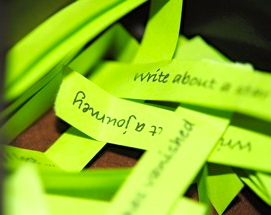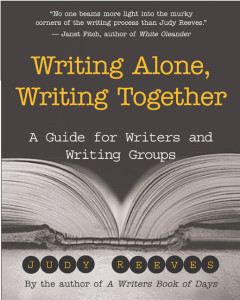For months now, every other week when it’s my turn to lead our Thursday Writers writing practice group, I open a copy of The Lively Muse Daily Appointment Calendar for Writers to find a prompt for us to write to. But when my co-facilitator Steve Montgomery told me one of our fellow practitioners suggested members of the group might like to offer up some prompts, too, I was inspired to create some new prompts of my own.
Creating good writing prompts (by good I mean a prompt that is compelling and evocative, an image or phrase that sets up a kind of buzzy excitement to put pen to page) has always been fun or me. I can’t even imagine how many I’ve created over the twenty-five years I’ve been leading writing practice groups, not to mention those that are in the books I’ve written about writing and writing practice.

As Steve and I were talking about what makes a good prompt, I remembered that I had written on this topic in Writing Alone, Writing Together. I pulled that well-worn book off my shelf to refresh my memory. Here are a few excerpts:

“… Prompts created for writing practice don’t give explicit direction. They are not intended to help the writer learn some particular skill or work in a certain area. Instead, based on the idea that what each person wants to write about will emerge organically as the writing occurs, the prompts are general and wide open with the unadorned invitation to ‘write about…’ and without additional directives such as ‘describe’ or ‘create’ or ‘remember’ or ‘imagine.’
“Writing prompts can be in the form of a simple word (mosaic, moonflower, iridescent, potpourri) or the suggestion to ‘Write about…’ (someone who left, a river, falling), a line from a poem (‘A year after your death…’ Czeslaw Milosz), or from a book (‘She learned to tell time with her skin,’ from Prodigal Summer by Barbara Kingsolver.). Anything that causes some slight hum of response as you read it can be the origin of a prompt.
…”The ingredients for a good prompt are much like the ingredients of a fine meal. When they are placed before us, we let go an involuntary ‘ummmmmm’ and we feel a delightful urge to pick up the pen and dive in.”
There are many more ideas about where and how to find and create good prompts in the book (p. 103-106)—opening the dictionary to a word, any word, and going from there; always having a notebook beside you when you read so you can record the perfect prompt when it appears; lyrics from a song, directions from a cookbook (“The mixture should be highly seasoned”). The real world is also a source for writing prompts—eavesdropping as we writers are wont to do, signs, graffiti, notes on a luncheon menu —and on and on.
So writing practitioners, keep your notebook with you, keep your senses alert to any kind of stimulation that sets the fingers itching, and create your own ongoing list of writing prompts. I copy mine to little strips of paper and put them in a cigar box. That way each prompt I pull will have a spontaneity that reading them from a list won’t have, a spontaneity that will transfer to the writing itself.
Not long ago I received an email from a writer who said that she wrote one of the best scenes she’d ever written from the prompt, “write about a hot wind.” What about you? What’s your favorite or most evocative prompt?

You found a key…
Oh yes! I know where that one lead. 🙂
Certainly your books Judy have been a great source of encouragement and inspiration to me in my writing practice. It’s really nice just to go back to them when difficulties surface in my work, just to pick up the spark again.
When I’m in flow I’m unconscious of time, place and any distracting presence that may be impinging on me – I just write. If I’m too disciplined, there seems to be an element of force and contrivance present which, I feel marks and scars the work. When the work flows I find there is very little need for me to edit afterwards. However, when I’m too head-strong and ‘disciplined,’ pushing the work uphill, I find there may be extensive reworking afterwards.
In the end I suppose there is a great mystery attached to the art of writing and I bow to this realization….
“ Everyday life, everyday language, everyday listening becomes liturgy when we take full responsibility for them, for example, when through intimacy with our actions, our actions become clarified and concrete. In the end a writer’s entire life ( including her writing ) is liturgy “.
Gail Sher
Thanks for stopping by, Michael. I know the feeling/experience of attempting to “force” the work. My pages have many more scratch outs and the language isn’t as evocative or lyrical, and the thoughts carried by the language not so “thoughtful.” Always good to hear from you. Thanks for quoting Gail Sher, too. One of my teachers via her books. Happy Holidays.
One of my own: the crows saw it first.
Crows: a most evocative critter. Of course that’s one of your prompts, Linda. Thanks for sharing it.